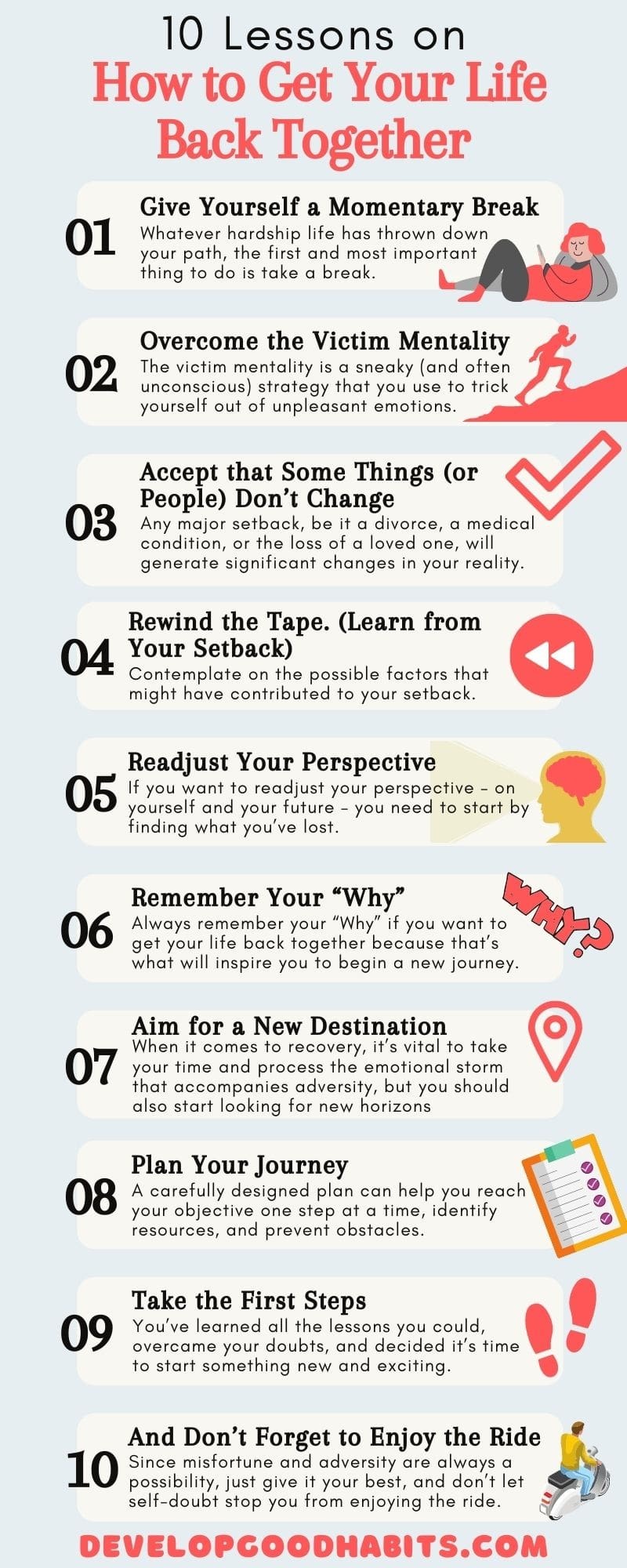There might be affiliate links on this page, which means we get a small commission of anything you buy. As an Amazon Associate we earn from qualifying purchases. Please do your own research before making any online purchase.
My career as a therapist began with a setback.
After about twenty sessions, my first ever client stopped showing up to our weekly sessions and never replied to my texts.
To this day, I have absolutely no idea why he chose to ghost me. And what makes it worse is that, in moments like these, I tend to hold myself responsible more than I should.
Although it might not sound like a big deal (dropouts are relatively common in my profession), for me, this was a pivotal moment. Aside from losing my motivation, I was starting to doubt my skills and the career path I had chosen.
Today, I want to share a few tips on how to get your life back together after a setback.
Whether it’s a professional setback or a personal struggle, the lessons I’m about to share will help you overcome adversity and misfortune.
10 Ways on How to Get Your Life Back Together
1. Give Yourself a Momentary Break
Let’s say you’ve just gone through an unpleasant situation.
Maybe the person you love broke up with you, or maybe your boss had to let you go, or perhaps you decided to pull the plug on a business that didn’t go as planned.
Whatever hardship life has thrown down your path, the first and most important thing to do is take a break.
You’ve just suffered a blow, so you’ll definitely need some time to pick up the broken pieces. Aside from that, you’re probably tired, disappointed, and unmotivated.
The point is, you’re in no condition to do something about it. At least not now.
It’s OK not to feel like talking about it right now.
It’s OK not to want to start fresh right now.
It’s OK to take a break.
What you’re feeling – the shame, anger, disappointment, or frustration – is perfectly normal.
These emotions are meant to teach you something, to prevent you from repeating the same mistake.
2. Overcome the Victim Mentality
When faced with setbacks and adversities, we often tend to come up with all sorts of excuses, place the responsibility onto someone else, and embrace the role of victim.
Why?
Because fabricating a story in which you are a victim of misfortune or the poor sucker who got played by others, absolves you of any responsibility for how the situation unfolded.
And when there’s no personal responsibility, there’s no reason to feel ashamed, disappointed, or frustrated.
Except, there are situations when you do hold some responsibility, whether you like it or not.
The victim mentality is a sneaky (and often unconscious) strategy that you use to trick yourself out of unpleasant emotions.
The only problem is that it reinforces helplessness and can prevent you from adopting a healthy and mature attitude towards failure or adversity.
As I said earlier, those emotions exist and manifest for a reason, and the only way to learn something about yourself is by confronting them.
3. Accept that Some Things (or People) Don’t Change
Any major setback, be it a divorce, a medical condition, or the loss of a loved one, will generate significant changes in your reality.
Or, to be more specific, in how you perceive your reality.
When you grow accustomed to things being a certain way, you enjoy a sense of comfort and predictability. You get this feeling that you know exactly how things will unfold, so there’s absolutely no reason to worry or prepare for the worst.
But this feeling ends the moment when something or someone disturbs this comfortable and (relatively) predictable reality in a profoundly negative way.

And when this happens, your first instinct might be to fix it somehow, to make things the way they were before in hopes of restoring that sense of comfort and predictability.
One typical example is when you get back together with your ex, only to break up again after a few weeks. Even though he/she might be the same person, you somehow convinced yourself that things would be different this time.
Instead of “milking a dead cow,” perhaps it would be healthier for you to accept that some unfortunate events are beyond repair.
However, there is something valuable you can gain out of setbacks and adversity.
And that is wisdom.
4. Rewind the Tape (Learn from Your Setback)
Once you’ve given up on fixing the unfixable and accepted your new reality, the next step in getting your life together after a setback is ‘rewinding the tape.’
And by this, I mean contemplating the possible factors that might have contributed to your setback.
Personally, whenever I’m dealing with setbacks, I use journaling to regain inner balance, figure out how things turned sour, and highlight important life lessons.
Sometimes, even the mere act of sitting with yourself, undistracted, and evaluating the situation from an objective, non-judgmental perspective can help you ‘mine’ wisdom out of adversity.
You may be surprised to discover that many factors have contributed to your setback, and many of them had nothing to do with you.
In other words, depending on the situation, there might not be a reason to hold yourself fully responsible (and feel riddled with guilt).
5. Readjust Your Perspective
Dealing with a major setback can be quite traumatic.
Perhaps not traumatic enough to trigger PTSD, but definitely shocking enough to alter your perspective.
A major setback like filing for bankruptcy or recovering after a car accident can change a lot.
It can shatter your self-esteem, awaken long-forgotten anxieties, alter your attitude towards risk, and even throw you into depression.
All these changes will inevitably alter the way you see yourself and envision your future.
If you want to readjust your perspective – on yourself and your future – you need to start by finding what you’ve lost.
Which part of your identity did you lose when adversity struck?
Did you lose your courage? Your ambition? Your self-confidence?
Whatever you feel like you’ve lost, remember how you got it in the first place.
You gained courage by taking risks and putting yourself face to face with adversity.
You gained ambition by setting goals and envisioning a brighter, happier life.
You gained confidence by mastering skills and putting them to use.
Whichever part of your identity you’ve lost, you can always rebuild.
6. Remember Your “Why”
In my opinion, “Why” is the question that unearths the reasons behind our actions and attitudes.
It is a question that cultivates introspection and takes you on a path of self-exploration and self-discovery.
Every goal you pursue, every risk you take, every challenging situation you put yourself through has a reason behind it.
Even those that didn’t go as planned or ended up in complete failure are fueled by deeply personal reasons.
Think about all the people you see at the gym. They’re all there to do the same thing – exercise.
But I’m sure the reasons why they exercise are different.
Some exercise to look good, others to stay healthy. Some are there to beat depression others are there to get over their ex.

What I’m trying to say is that ideas turn into actions that lead to results.
But when adversity strikes and results fail to materialize, you often tend to forget your “Why.”
And that’s when things go downhill as you lose the motivation to start over.
If you want to get your life back together after a major setback, remember your “Why” because that’s what will inspire you to begin a new journey.
7. Aim for a New Destination
I believe that adversity provides valuable learning opportunities that can help you achieve something even greater than what you were pursuing in the first place.
Whether you’ve lost a marriage, a job, or a house, perhaps this experience, as painful and unwanted as it was, will give rise to fresh opportunities.
When it comes to recovery, it’s vital to take your time and process the emotional storm that accompanies adversity, but you should also start looking for new horizons.
So, part of overcoming setbacks is investing in personal growth.
The sooner you start focusing on a new path, the faster you’re going to get over your setback.
That means a new set of goals to pursue and a new destination to reach.
Whether it’s a new relationship, an exciting business opportunity, or even a new skill you wish to master, focus on something constructive that cultivates a sense of achievement.
But just because you’re aiming for something new doesn’t mean you will forget about your setback, and nor should you.
After all, it was probably an experience that redefined your identity.
8. Plan Your Journey
Now that you have a new goal in mind, it’s time to start planning.
It’s one thing to envision a brighter future; it’s another thing to plan for it.
For me, planning is just as important as execution.
A carefully designed plan can help you reach your objective one step at a time, identify resources, and prevent obstacles. It efficiently channels your time and effort and cultivates a sense of discipline.
Whether you’re looking to start a new relationship or invest in a new career path, you can pursue your goal in a planned manner.

And YES, even goals like starting a new relationship or solidifying a friendship can be approached through a plan.
Let’s say you went through a major setback when your spouse left, and now you want to get back in the dating game. You can easily divide this goal into several steps.
For example, you can do a wardrobe refresh, start a self-care routine, go out more often, and join an online dating site.
All these mini-goals will contribute to and converge towards your big goal: finding someone new.
Never underestimate the value of planning, even when you’re applying it to aspects related to your social life.
9. Take the First Steps
This is the point where you start your new journey.
You’ve learned all the lessons you could, overcame your doubts, and decided it’s time to start something new and exciting.
Although the perspective of a new journey sounds pretty inspiring, the memory of your loss, failure, or mistake will still linger for a while.
And that’s perfectly OK as long as you don’t let your past stop you from taking the first steps towards the future.
In situations like these, you don’t wait for fear and doubt to vanish completely.
You take a chance and act despite all the fear, doubt, and second-guessing that may hold you back from reaching your new destination.
I’m not going to lie to you.
Yes, failure is a possibility.
Yes, there’s a chance that you will be disappointed again.
And yes, life could always throw misfortune and adversity your way.
But doing absolutely nothing just because you don’t want to suffer a setback is the worst possible option.
10. And Don’t Forget to Enjoy the Ride
I think a new personal or professional journey can be an excellent chance to put things in perspective, reflect on your past, and maybe even start showing some self-compassion.
A new journey can also be the perfect opportunity to be grateful for where you are right now, the resources you have, and all the achievements that await you along the way.
In fact, this journey of self-discovery and self-improvement could go on for the rest of your life.
And since misfortune and adversity are always a possibility, just give it your best, and don’t let self-doubt stop you from enjoying the ride.
There are other strategies you can use when trying to recover from a major setback in life. If you want to learn more, take a few minutes to watch this video:
Final Thoughts on How to Get Your Life Back Together
Whether we like it or not, setbacks will always be part of life, especially if you’re the kind of person who wants to move forward and keep growing on all levels.
Whenever adversity strikes, the best advice I can give you on how to get your life back together after a major setback is:
Remember that our journey through life is sprinkled with success, failure, mistakes, lessons, setbacks, and achievements.
It may not always be fun and easy, but it’s definitely worth it.
And if you're looking for some inspiration in your journey, check out these blog posts;
- 61 Resilience Quotes to Overcome Any Adversity
- 91 Perseverance Quotes About Overcoming Adversity in Life
- 101 Stay Strong Quotes to Be Positive During a Crisis

Alexander Draghici is a licensed Clinical Psychologist, CBT practitioner, and content writer for various mental health websites. His work focuses mainly on strategies designed to help people manage and prevent two of the most common emotional problems – anxiety and depression.
Finally, if you want to increase your happiness and life satisfaction, then watch this free video that details the 7-minute habit for planning your day to focus on what's important.


